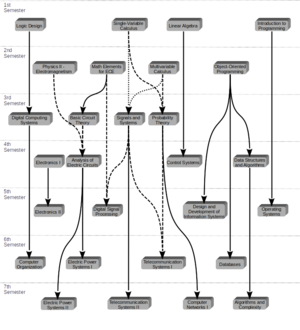Course Catalog
Subject Areas of the Courses
The courses of the School of ECE are divided into eight (8) scientific areas.
1. Electronics and Computer Architecture [ ECA ]
This area covers topics related to the design, implementation, and analysis of analog and digital electrical, electronic systems.
2. Systems [ SYS ]
This area covers topics related to systems theory (automatic and optimal control, neural networks, fuzzy logic) and their applications (biomedicine, quality control).
3. Telecommunications [ TEL ]
This area covers topics related to telecommunication systems (telephone, network, wireless) and information processing (sound, voice, image, data).
4. Informatics [ INF ]
This area covers topics related to basic principles of information technology (programming, operating systems, databases, algorithms, software engineering).
5. Energy Systems [ ENE ]
This area covers knowledge of conventional and modern energy production, storage, distribution, and management systems.
6. ECE Science [ ECE ]
This area covers topics related to the scientific subject of electrical and computer engineering, through seminar courses, internships, etc.
7. Mathematics [ MTH ]
This area covers topics related to basic and advanced mathematics for engineers.
8. Physics [ PHY ]
This area covers topics related to physics for engineers.
Courses offered by academic units outside the School of ECE are classified in the following areas.
1. Chemistry [ CHE ]
This area covers topics related to chemistry for engineers.
2. Society, Science, Culture [ SOC ]
This area covers topics related to humanities subjects.
3. Production and Management [ PEM ]
This area covers topics related to production and management, industrial design, and computer-aided design. It is part of the School of Production and Management Engineering.
4. English Language [ ENG ]
This area covers the oral and written use of English language. It is part of the Language Center.
5. Chinese Language [ CHN ]
This area covers the oral and written use of Chinese language. It is part of the Language Center.
Course Numbering
For easy reference, the courses in the School of ECE have been coded as follows.
-
The abbreviation of the subject area precedes the abbreviation followed by a three-digit numerical code
-
The first digit indicates the year of study to which the course corresponds
-
The second digit is 0 for compulsory courses and 1 or 2 for optional courses
-
The third digit is the serial number of the course in the corresponding area
Detailed Description of the Courses
The following summary tables list all the courses in the curriculum by semester. For each course, the title, the code, the credit units (ECTS), the weekly hours of lectures (Lec), the weekly hours of recitation (Rec), the weekly hours of laboratory (Lab), the necessary prerequisite courses, and the recommended prerequisite courses are noted. The following is information on the courses from which the student can choose during his/her studies, as well as some restrictions on their choice.
| ECTS: credit units | Rec: weekly hours of recitation | Prereq.: necessary prerequisite courses |
| Lec: weekly hours of lectures | Lab: weekly hours of laboratory | Recomm.: recommended prerequisite courses |

Prerequisite Courses
Registration to certain compulsory courses of the curriculum of the School of ECE requires the successful completion of specific compulsory courses of lower semesters, as decided by the Assembly of the School. These courses, and their dependency on the corresponding prerequisite courses, are shown in detail in the dependency chart below. Note that there are only dependencies between years and not between semesters, so that students have multiple opportunities to successfully pass the prerequisite courses.
Choice of Courses
To complete the curriculum at the School of Electrical and Computer Engineering, students are required to select and successfully complete at least sixteen (16) elective required courses according to the following restrictions.
-
At least fourteen (14) courses within the School of ECE: The elective compulsory courses taught within the School of Electrical and Computer Engineering are listed by semester in the tables above and are coded ECA, INF, ECE, TEL, SYS, ENE, MTH, and PHY. This category also includes graduate courses of the School with the corresponding codes that the student may choose, if desired, with the permission of the instructor.
-
At most one (1) course from the School of Production Engineering and Management:
- CHE 111 General Chemistry
- PEM 411 Dynamic Programming
- PEM 412 Small and Medium Enterprises and Innovation
- PEM 311 Simulation
- SYS 512 PEM 512 Robotics
-
At most one (1) course from the following humanities courses:
- SSC 111 Art and Technology
- SSC 112 History of Civilization
- SSC 311 Sociology
- SSC 314 Political Economy
- SSC 315 Introduction to Philosophy
- SSC 411 Micro- and Macro-Economic Analysis
- SSC 312 Philosophy and History of Science
- SSC 412 Elements of Law and Technical Legislation
- SSC 413 Industrial Sociology
Students are advised to pay attention to their choice of courses in order to complete the minimum number of credits required to obtain a diploma.




